Unit 1 Teenage Life Discovering Useful Structures 课件(共24张PPT)-2025-2026学年人教版(2019)必修第一册
文档属性
| 名称 | Unit 1 Teenage Life Discovering Useful Structures 课件(共24张PPT)-2025-2026学年人教版(2019)必修第一册 | 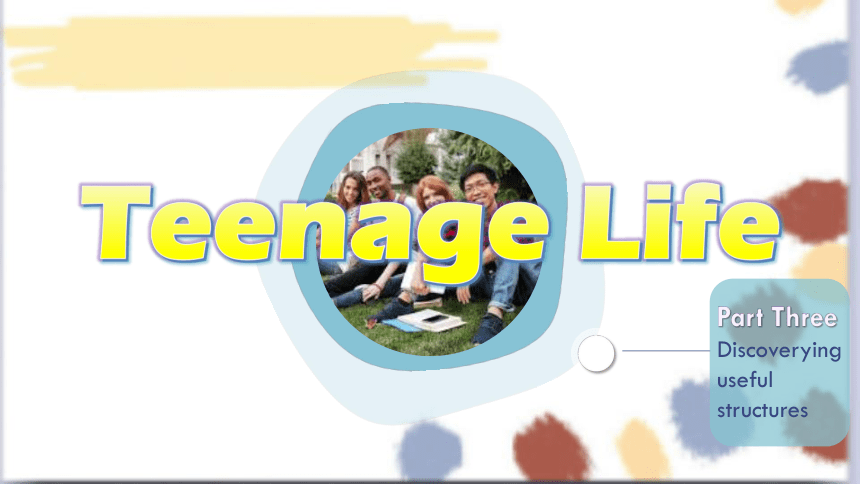 | |
| 格式 | pptx | ||
| 文件大小 | 41.2MB | ||
| 资源类型 | 教案 | ||
| 版本资源 | 人教版(2019) | ||
| 科目 | 英语 | ||
| 更新时间 | 2025-07-28 17:15:38 | ||
图片预览

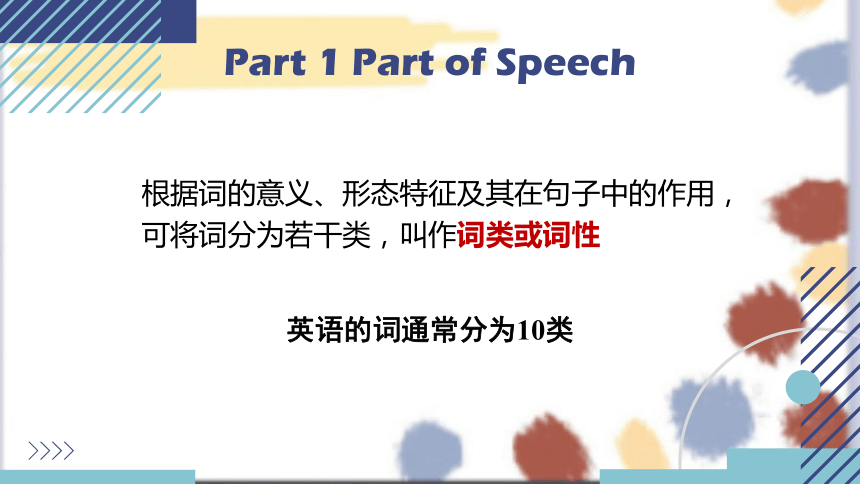
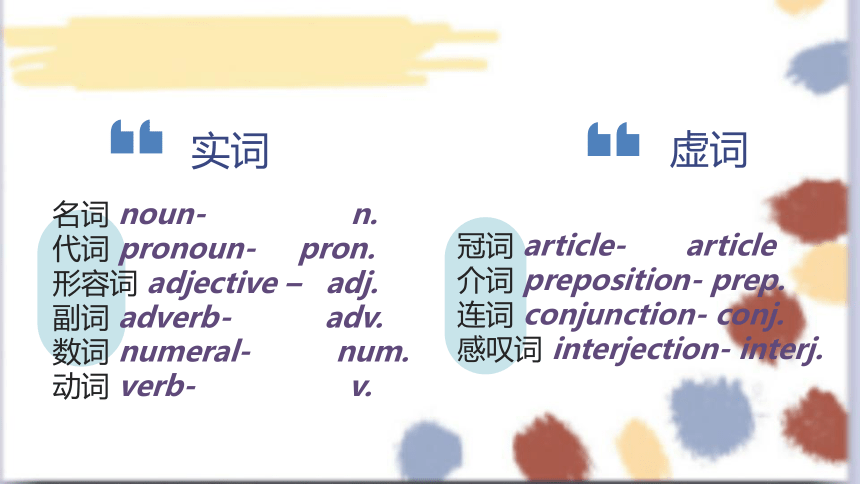
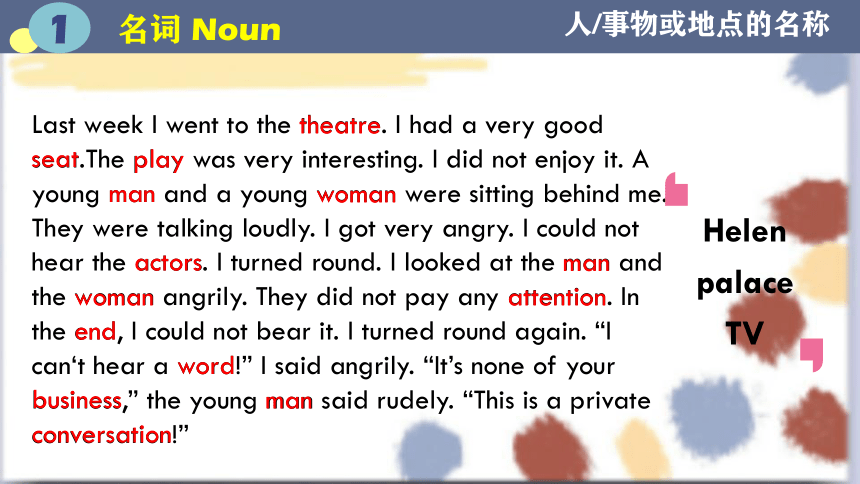
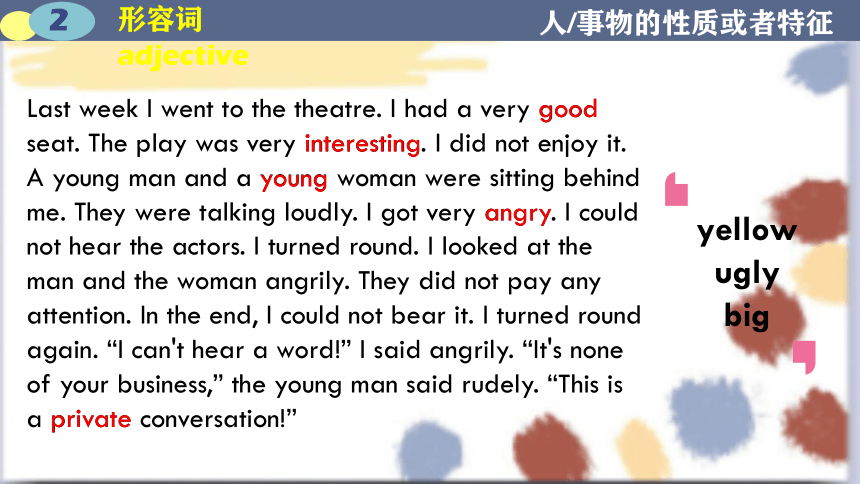
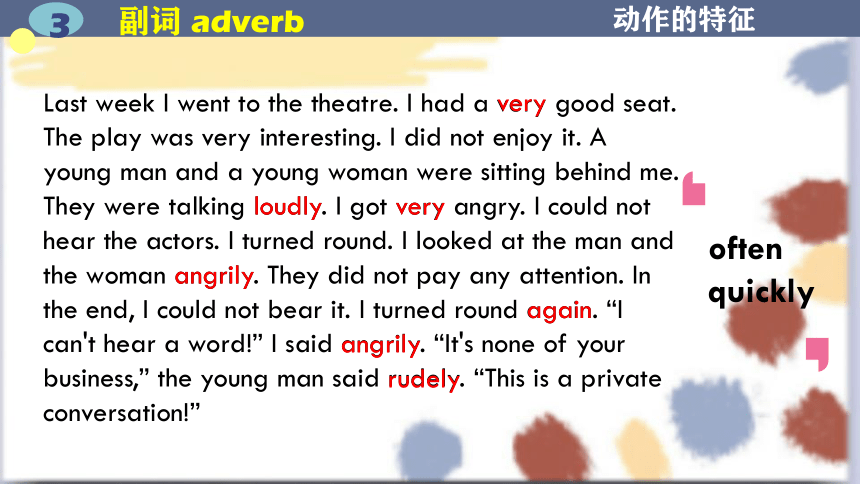
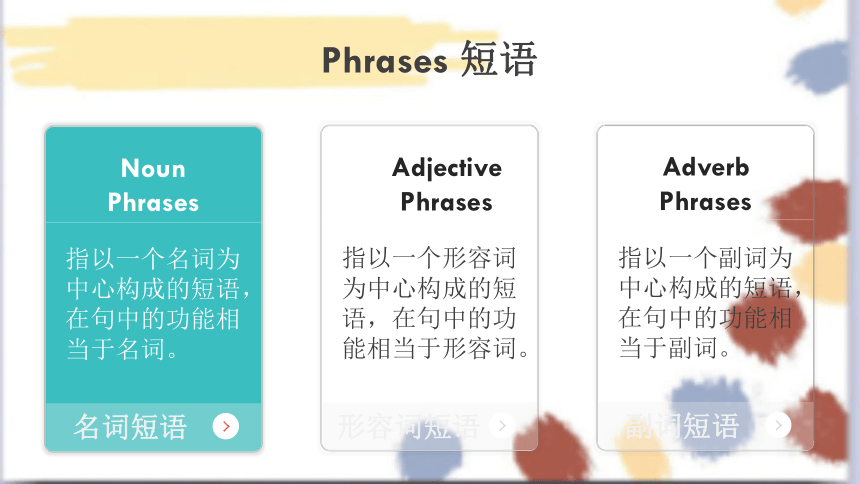
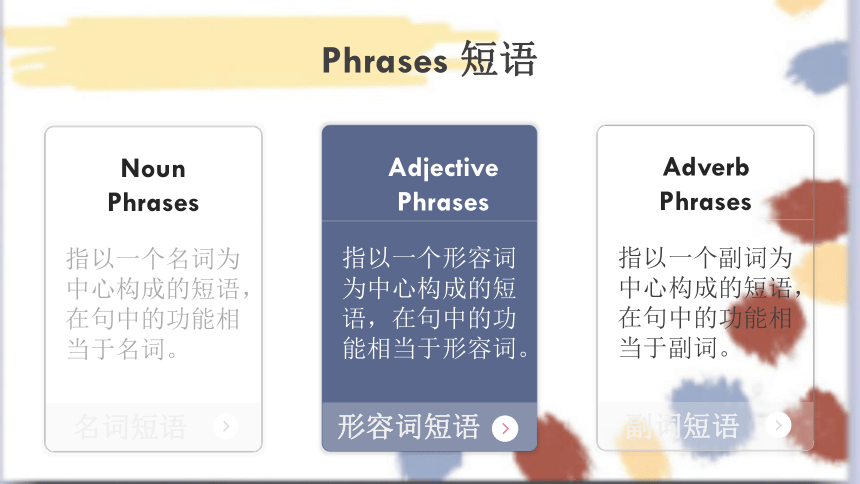
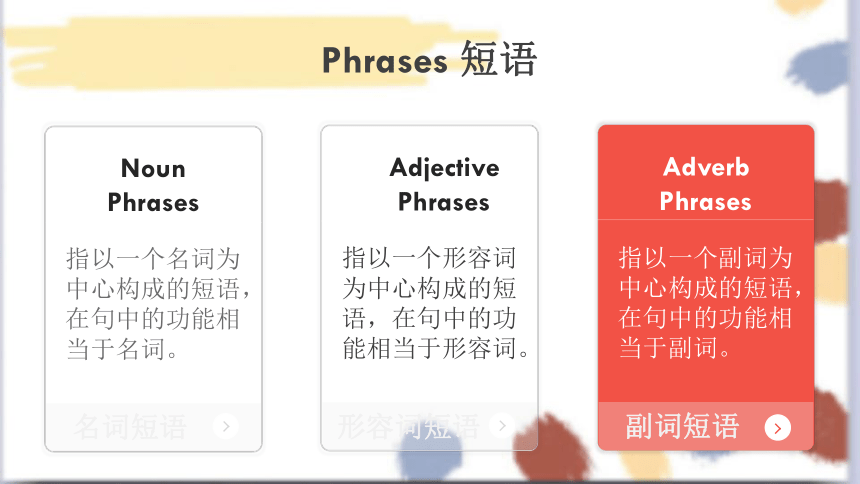
文档简介
(共24张PPT)
Teenage Life
Part Three
Discoveryinguseful
structures
Part 1 Part of Speech
根据词的意义、形态特征及其在句子中的作用,可将词分为若干类,叫作词类或词性
英语的词通常分为10类
名词 noun- n.
代词 pronoun- pron.
形容词 adjective – adj.
副词 adverb- adv.
数词 numeral- num.
动词 verb- v.
冠词 article- article
介词 preposition- prep.
连词 conjunction- conj.
感叹词 interjection- interj.
实词
虚词
Last week I went to the theatre. I had a very good seat.The play was very interesting. I did not enjoy it. A young man and a young woman were sitting behind me. They were talking loudly. I got very angry. I could not hear the actors. I turned round. I looked at the man and the woman angrily. They did not pay any attention. In the end, I could not bear it. I turned round again. “I can‘t hear a word!” I said angrily. “It’s none of your business,” the young man said rudely. “This is a private conversation!”
名词 Noun
1
人/事物或地点的名称
theatre
Helen
palace
TV
seat
play
man
woman
actors
man
woman
attention
word
man
conversation
end
business
形容词 adjective
2
人/事物的性质或者特征
Last week I went to the theatre. I had a very good seat. The play was very interesting. I did not enjoy it. A young man and a young woman were sitting behind me. They were talking loudly. I got very angry. I could not hear the actors. I turned round. I looked at the man and the woman angrily. They did not pay any attention. In the end, I could not bear it. I turned round again. “I can't hear a word!” I said angrily. “It's none of your business,” the young man said rudely. “This is a private conversation!”
yellow ugly
big
good
interesting
angry
young
private
Last week I went to the theatre. I had a very good seat. The play was very interesting. I did not enjoy it. A young man and a young woman were sitting behind me. They were talking loudly. I got very angry. I could not hear the actors. I turned round. I looked at the man and the woman angrily. They did not pay any attention. In the end, I could not bear it. I turned round again. “I can't hear a word!” I said angrily. “It's none of your business,” the young man said rudely. “This is a private conversation!”
副词 adverb
3
动作的特征
very
very
loudly
angrily
again
often
quickly
rudely
angrily
Phrases 短语
指以一个名词为中心构成的短语,在句中的功能相当于名词。
名词短语
Noun Phrases
指以一个形容词为中心构成的短语,在句中的功能相当于形容词。
形容词短语
Adjective Phrases
指以一个副词为中心构成的短语,在句中的功能相当于副词。
副词短语
Adverb Phrases
指以一个名词为中心构成的短语,在句中的功能相当于名词。
名词短语
Noun Phrases
指以一个形容词为中心构成的短语,在句中的功能相当于形容词。
形容词短语
Adjective Phrases
指以一个副词为中心构成的短语,在句中的功能相当于副词。
副词短语
Adverb Phrases
Phrases 短语
指以一个名词为中心构成的短语,在句中的功能相当于名词。
名词短语
Noun Phrases
指以一个形容词为中心构成的短语,在句中的功能相当于形容词。
形容词短语
Adjective Phrases
指以一个副词为中心构成的短语,在句中的功能相当于副词。
副词短语
Adverb Phrases
Phrases 短语
名词短语
1
Noun Phrase
a beautiful campus
some school clubs
a beautiful campus of my school
限定词+形容词+名词
限定词+名词+名词
介词+名词
1.在句中作名词使用
2.一般用作主语/宾语/表语/宾语补足语/状语
名词短语
1
Noun Phrase
Noun Phrase(NP):
指出下列句子中画线名词短语在句中所作的句子成分
(1)These ideas may seem strange to you.____________
(2)We love our great motherland very much._______
(3)The man wearing a black coat is our teacher._____
(4)Those beautiful flowers come from Yun’nan.___
(5)We elected him monitor of our class.____________
主语
宾语
表语
主语
宾语补足语
Max was last seen after taking a trip away from home. Have you seen this boy?
Max was last seen wearing a t-shirt. He has face, skin, eyes and hair. Usually he is friendly and smiling. He is close to his family,so this disappearance is extremely unusual. Help us find him. Urgently!
形容词短语
2
Adjective Phrase
very suitable
really very confusing
strong enough
good for nothing
1.在句中作形容词使用
2.修饰名词或代词,也用作表语或者宾语补足语.
副词+形容词
副词+形容词
形容词+enough
形容词+介词短语
Adjective Phrase(AdjP):
指出下列句子中画线短语在句中所作的句子成分
(1)The air today is nice and clean. ____________
(2)She is a girl lively and lovely. ____________
(3)He found the film very interesting.____________
表语
定语
宾语补足语
副词短语
3
Adverb Phrase
very quickly
quite well
far too fast
much more creatively
1.在句中作副词使用
2.修饰动词/形容词/副词
副词+副词
Adverb Phrase(AdvP):
副词adv.作状语
1. I think my life in the future will be great, so I must study quite hard now.
2. This pair of shoes is far too suitable for me.
3. Very luckily, he was not in the house then.
修饰动词
修饰形容词
修饰句子
very, really, so, extremely, absolutely, quite, pretty
A little, slightly
enough
Divide the phrases in different groups
a really big challenge
a little confusing
very carefully
the school advisor
a very difficult language
quite difficult
much more carefully
far too fast
all the subjects
so quickly
my advanced course
strong enough
a bit worried
extra-curricular activities
名词短语
1
形容词短语
2
副词短语
3
1
2
3
1
1
2
3
3
1
3
1
2
2
1
EXERCISE
The first week was a little confusing.
The building is so big that I'm completely lost.
The kids over there are putting something on a round paper plate.
Find and mark the phrases in the sentences that fit the categories above.
1
2
3
EXERCISE
NP
AdjP
NP
AdjP
AdjP
NP
NP
Linda thinks and speaks quite quickly, and she can do well in the debate.
The new coach told me that I didn’t play well enough.
My first French class was very confusing. The teacher spoke so fast.
4
5
6
AdvP
NP
AdvP
NP
AdjP
AdvP
NP
NP
NP + AdjP + AdvP:
I’ve always wanted to be a cheerleader. Yesterday, I tried out for the team. It was hard. First, we had to dance. The teacher showed us how to move, and then we tried. Second, we practised singing a song about the school basketball team. Finally, some girls had to lift their partners. The other girls jumped and cheered. I think I did well, but the other girls were better. I’m not sure whether I’ll make the team or not.
a high school cheerleader
my school’s cheerleading team
really hard
dance up and down in pairs
tried very hard
a short fight song
many of the other girls
jumped very high and cheered so loudly
quite well in the try-out
some of the stronger girls
even better
形容词变副词的规则
1.一般情况直接加ly。
如:kind-kindly great-greatly
2.辅音字母加e结尾,直接加ly。
如:immediate-immediately, fortunate- fortunately
3.元音字母加e结尾,去e加ly。
如:true-truly
4. le结尾,去e加y。
如:simple-simply, possible-possibly(whole-wholly除外)
形容词变副词的规则
5.辅音字母加y结尾,改y为i再加ly。
如:easy-easily,happy-happily
(shy-shyly除外)
6. l结尾加ly。 如:final-finally
7. ll结尾加y。 如:full-fully
8. ic结尾加ally。
如:basic-basically, scientific-scientifically (public-publicly除外)
形容词变副词的规则
easy possible
true careful
full shy
automatic(自动的) clear
angry fortunate(幸运的)
lucky obvious
final whole
easily
truly
fully
automatically
angrily
luckily
finally
possibly
carefully
shyly
clearly
fortunately
obviously
wholly
Teenage Life
Part Three
Discoveryinguseful
structures
Part 1 Part of Speech
根据词的意义、形态特征及其在句子中的作用,可将词分为若干类,叫作词类或词性
英语的词通常分为10类
名词 noun- n.
代词 pronoun- pron.
形容词 adjective – adj.
副词 adverb- adv.
数词 numeral- num.
动词 verb- v.
冠词 article- article
介词 preposition- prep.
连词 conjunction- conj.
感叹词 interjection- interj.
实词
虚词
Last week I went to the theatre. I had a very good seat.The play was very interesting. I did not enjoy it. A young man and a young woman were sitting behind me. They were talking loudly. I got very angry. I could not hear the actors. I turned round. I looked at the man and the woman angrily. They did not pay any attention. In the end, I could not bear it. I turned round again. “I can‘t hear a word!” I said angrily. “It’s none of your business,” the young man said rudely. “This is a private conversation!”
名词 Noun
1
人/事物或地点的名称
theatre
Helen
palace
TV
seat
play
man
woman
actors
man
woman
attention
word
man
conversation
end
business
形容词 adjective
2
人/事物的性质或者特征
Last week I went to the theatre. I had a very good seat. The play was very interesting. I did not enjoy it. A young man and a young woman were sitting behind me. They were talking loudly. I got very angry. I could not hear the actors. I turned round. I looked at the man and the woman angrily. They did not pay any attention. In the end, I could not bear it. I turned round again. “I can't hear a word!” I said angrily. “It's none of your business,” the young man said rudely. “This is a private conversation!”
yellow ugly
big
good
interesting
angry
young
private
Last week I went to the theatre. I had a very good seat. The play was very interesting. I did not enjoy it. A young man and a young woman were sitting behind me. They were talking loudly. I got very angry. I could not hear the actors. I turned round. I looked at the man and the woman angrily. They did not pay any attention. In the end, I could not bear it. I turned round again. “I can't hear a word!” I said angrily. “It's none of your business,” the young man said rudely. “This is a private conversation!”
副词 adverb
3
动作的特征
very
very
loudly
angrily
again
often
quickly
rudely
angrily
Phrases 短语
指以一个名词为中心构成的短语,在句中的功能相当于名词。
名词短语
Noun Phrases
指以一个形容词为中心构成的短语,在句中的功能相当于形容词。
形容词短语
Adjective Phrases
指以一个副词为中心构成的短语,在句中的功能相当于副词。
副词短语
Adverb Phrases
指以一个名词为中心构成的短语,在句中的功能相当于名词。
名词短语
Noun Phrases
指以一个形容词为中心构成的短语,在句中的功能相当于形容词。
形容词短语
Adjective Phrases
指以一个副词为中心构成的短语,在句中的功能相当于副词。
副词短语
Adverb Phrases
Phrases 短语
指以一个名词为中心构成的短语,在句中的功能相当于名词。
名词短语
Noun Phrases
指以一个形容词为中心构成的短语,在句中的功能相当于形容词。
形容词短语
Adjective Phrases
指以一个副词为中心构成的短语,在句中的功能相当于副词。
副词短语
Adverb Phrases
Phrases 短语
名词短语
1
Noun Phrase
a beautiful campus
some school clubs
a beautiful campus of my school
限定词+形容词+名词
限定词+名词+名词
介词+名词
1.在句中作名词使用
2.一般用作主语/宾语/表语/宾语补足语/状语
名词短语
1
Noun Phrase
Noun Phrase(NP):
指出下列句子中画线名词短语在句中所作的句子成分
(1)These ideas may seem strange to you.____________
(2)We love our great motherland very much._______
(3)The man wearing a black coat is our teacher._____
(4)Those beautiful flowers come from Yun’nan.___
(5)We elected him monitor of our class.____________
主语
宾语
表语
主语
宾语补足语
Max was last seen after taking a trip away from home. Have you seen this boy?
Max was last seen wearing a t-shirt. He has face, skin, eyes and hair. Usually he is friendly and smiling. He is close to his family,so this disappearance is extremely unusual. Help us find him. Urgently!
形容词短语
2
Adjective Phrase
very suitable
really very confusing
strong enough
good for nothing
1.在句中作形容词使用
2.修饰名词或代词,也用作表语或者宾语补足语.
副词+形容词
副词+形容词
形容词+enough
形容词+介词短语
Adjective Phrase(AdjP):
指出下列句子中画线短语在句中所作的句子成分
(1)The air today is nice and clean. ____________
(2)She is a girl lively and lovely. ____________
(3)He found the film very interesting.____________
表语
定语
宾语补足语
副词短语
3
Adverb Phrase
very quickly
quite well
far too fast
much more creatively
1.在句中作副词使用
2.修饰动词/形容词/副词
副词+副词
Adverb Phrase(AdvP):
副词adv.作状语
1. I think my life in the future will be great, so I must study quite hard now.
2. This pair of shoes is far too suitable for me.
3. Very luckily, he was not in the house then.
修饰动词
修饰形容词
修饰句子
very, really, so, extremely, absolutely, quite, pretty
A little, slightly
enough
Divide the phrases in different groups
a really big challenge
a little confusing
very carefully
the school advisor
a very difficult language
quite difficult
much more carefully
far too fast
all the subjects
so quickly
my advanced course
strong enough
a bit worried
extra-curricular activities
名词短语
1
形容词短语
2
副词短语
3
1
2
3
1
1
2
3
3
1
3
1
2
2
1
EXERCISE
The first week was a little confusing.
The building is so big that I'm completely lost.
The kids over there are putting something on a round paper plate.
Find and mark the phrases in the sentences that fit the categories above.
1
2
3
EXERCISE
NP
AdjP
NP
AdjP
AdjP
NP
NP
Linda thinks and speaks quite quickly, and she can do well in the debate.
The new coach told me that I didn’t play well enough.
My first French class was very confusing. The teacher spoke so fast.
4
5
6
AdvP
NP
AdvP
NP
AdjP
AdvP
NP
NP
NP + AdjP + AdvP:
I’ve always wanted to be a cheerleader. Yesterday, I tried out for the team. It was hard. First, we had to dance. The teacher showed us how to move, and then we tried. Second, we practised singing a song about the school basketball team. Finally, some girls had to lift their partners. The other girls jumped and cheered. I think I did well, but the other girls were better. I’m not sure whether I’ll make the team or not.
a high school cheerleader
my school’s cheerleading team
really hard
dance up and down in pairs
tried very hard
a short fight song
many of the other girls
jumped very high and cheered so loudly
quite well in the try-out
some of the stronger girls
even better
形容词变副词的规则
1.一般情况直接加ly。
如:kind-kindly great-greatly
2.辅音字母加e结尾,直接加ly。
如:immediate-immediately, fortunate- fortunately
3.元音字母加e结尾,去e加ly。
如:true-truly
4. le结尾,去e加y。
如:simple-simply, possible-possibly(whole-wholly除外)
形容词变副词的规则
5.辅音字母加y结尾,改y为i再加ly。
如:easy-easily,happy-happily
(shy-shyly除外)
6. l结尾加ly。 如:final-finally
7. ll结尾加y。 如:full-fully
8. ic结尾加ally。
如:basic-basically, scientific-scientifically (public-publicly除外)
形容词变副词的规则
easy possible
true careful
full shy
automatic(自动的) clear
angry fortunate(幸运的)
lucky obvious
final whole
easily
truly
fully
automatically
angrily
luckily
finally
possibly
carefully
shyly
clearly
fortunately
obviously
wholly
